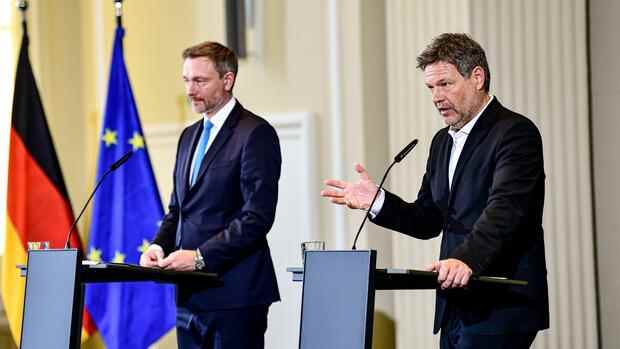The finance and economics ministers will present aid for companies affected by the consequences of the Ukraine war.
(Photo: dpa)
Berlin The federal government has agreed on an aid package for companies suffering from the consequences of the Ukraine war and the detachment from Russia. Companies that are suffering from high energy prices should benefit in particular. But there are also plans to help companies that get into trouble due to collapsing supply chains or the decoupling from Russia.
“We will cushion hardship and prevent structural breaks,” said Federal Finance Minister Christian Lindner (FDP) at the presentation on Friday in Berlin. He spoke of an “economic policy shock absorber” for companies.
Federal Minister of Economics Robert Habeck (Greens) added that not every hardship, every euro more in energy costs can be compensated: “However, the burden must not be so high that the economy collapses.”
The aid package consists of five components. Lindner and Habeck plan that everyone will be available to the economy by June 1st. The help at a glance:
Top jobs of the day
Find the best jobs now and
be notified by email.
1. General subsidy for high energy costs
A time-limited cost subsidy is planned for companies suffering from high energy prices. The basis for this is the energy costs for 2021. If the costs are now more than twice as high, the companies are entitled to the subsidy. The level increases the greater the load from the energy costs.
However, when presenting the package, Habeck explained that not all companies can take advantage of all levels of the subsidy. For the higher aid, the companies would have to fall under the EU’s energy aid guidelines. According to Habeck, this applies above all to the chemical, glass, steel, metal and ceramics sectors.
In business, the restriction causes criticism. “A restriction to the list of sectors in the energy aid guideline is too narrow and not necessary under European law,” said Peter Adrian, President of the Association of German Chambers of Industry and Commerce (DIHK). It is important that the support is available to energy-intensive companies from all sectors.
2. 100 billion euro loan guarantees for the energy industry
Credit lines from the state KfW development bank, backed by a federal guarantee, are planned for the troubled energy industry. A total credit volume of up to EUR 100 billion is planned for this measure. This can be used by energy companies that have to deposit massive amounts of additional collateral, so-called margins, on the stock exchange due to the high prices. “We must under no circumstances allow security-related companies to fall,” said Habeck.
KfW had already supported the first energy companies with loans that had gotten into trouble due to the margins. But these were “emergency operations”, explained Habeck. Now there is a regulated process, so that companies no longer have to ask the government through complicated channels: “Do you have another euro?”
3. KfW loan program
Similar to the corona crisis, a loan program is to be set up with KfW, especially for medium-sized and small companies. Companies of all sizes should have access to low-interest, non-liability loans. The ministries estimate the credit volume at seven billion euros.
4. Guarantees
In addition, individual extensions to the federal and state guarantee programs for companies affected by the Ukraine war that were already introduced during the corona pandemic are to be continued. This affects the guarantee banks and the large guarantee program.
5. Equity support only in individual cases, no agreement at the WSF
Economics Minister Habeck would have liked to have included equity and hybrid capital investments in the package on a large scale. To do this, he wanted to rededicate the 150 billion euro Economic Stabilization Fund (WSF) from the corona crisis. But cabinet colleague Lindner opposed it, as the Handelsblatt recently reported.
Instead, Habeck and Lindner now declared on Friday that they only want to use equity and hybrid capital assistance in individual cases. Lindner argued that the use of the WSF was linked to many requirements, such as a separate law and a complex legal review.
However, it can be heard from government circles that Lindner does not consider the WSF to be the right instrument in the current crisis and has therefore not changed his position at Habeck’s request. However, Lindner left a back door open for the WSF: keep all your options open.
However, the other coalition partners in the alliance are putting pressure on them. With the WSF, the government made an important contribution to stabilizing the German economy during the corona crisis, explains Hannes Walter (SPD), Vice-Chairman of the Economic Committee.
“I think we should continue to use this proven instrument in a targeted manner. Loan programs alone do not do justice to the challenge we are facing,” Walter told Handelsblatt.
Financing via supplementary budget
Lindner explained that the affected companies should first be supported by the loans and guarantees. If that is not enough, grants and equity support could be used. The FDP leader wants to finance the new aid through the supplementary budget. This is expected to increase to 24 billion euros.
More: Habeck wants to rededicate 150 billion euros corona fund for the Ukraine war – Lindner walls
